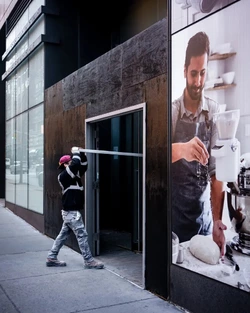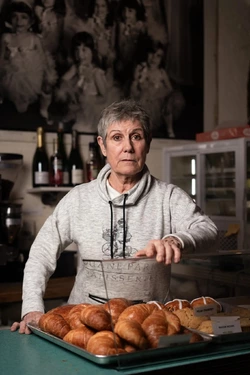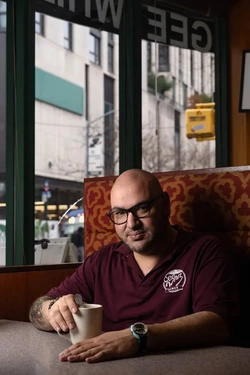
Currently under construction, Hobby Lobby’s Manhattan store is in a large retail space that previously housed Bed Bath & Beyond and Barnes & Noble. Oliver Farshi for The New York Times
By Jane Margolies
April 9, 2025 Updated 9:09 a.m. ET
In the Lower Manhattan neighborhood of TriBeCa, known for its liberal politics and sky-high rents, a new retailer, known for its conservative Christian convictions, rock-bottom prices and steadfast customers in rural America, is moving in.
Now the question is, can this retailer, Hobby Lobby, make it in Manhattan?
The retailer, which is expected to open this spring and is taking over 75,000 square feet that used to be a Bed Bath & Beyond and Barnes & Noble for its first Manhattan store, should have prompted an enthusiastic response given the surge of Americans who picked up crafts hobbies during the pandemic.
Instead, the reaction has been mixed, with some residents feeling affronted that Hobby Lobby is opening in their neighborhood. Local groups and forums that are protesting the company’s arrival in TriBeCa point to Hobby Lobby’s work with organizations that oppose gay and transgender rights. They haven’t forgotten the private company’s lawsuit in 2014 to fight against having to provide insurance coverage for contraception for employees.

A construction worker moving building materials into Hobby Lobby’s new Manhattan location. Oliver Farshi for The New York Times
Over a decade later, it remains to be seen whether low prices and a staggering selection of products are enough to make residents in an area that has long been a liberal stronghold look past the company’s conservative bent. The neighborhood, known for cobblestone streets and converted loft buildings that are now home to affluent families and A-list celebrities, is solidly Democratic, but, like much of New York, it shifted to the right during the 2024 election.
Heide Fasnacht, an artist who has lived and worked in TriBeCa for five decades, said she felt “angry” about the arrival of a company that promotes the evangelical Protestant convictions of its founder.
“I moved to New York to get away from things like that,” said Ms. Fasnacht, who was calling for a boycott of the store.

“There are probably a lot of people here who do crafts, I’m sure,” says Heide Fasnacht, an artist who lives in TriBeCa. While she appreciates increased access to materials, she strongly opposes the new store. Oliver Farshi for The New York Times
Madeline Lanciani, the owner of Duane Park Patisserie, a couple of blocks from Hobby Lobby’s location in TriBeCa, also considers herself part of the resistance. “I will gladly go out of my way to shop somewhere else,” she said.
Hobby Lobby is no stranger to protests against its business. Its owners, David and Barbara Green, are outspoken about their Christian faith, which has infused the culture of the retailer. The company has said its guiding principle is “honoring the Lord in all we do by operating the company in a manner consistent with biblical principles.” The stores remain closed on Sunday and sell Christian-themed goods.
Despite backlash from residents like Ms. Fasnacht and Ms. Lanciani, Hobby Lobby is making inroads in New York at what appears to be an opportune time: One of its main competitors, Joann, which sold fabrics and crafts supplies for over 80 years, said in February that it was going out of business and closing all of its roughly 800 stores, including 30 in New York. Another competitor, Michaels, went through a leveraged buyout in 2021.

Madeline Lanciani, owner of Duane Park Patisserie, opposes the new Hobby Lobby and said, “Their corporate culture is completely antithetical to everything that I value.” Oliver Farshi for The New York Times
Hobby Lobby, by contrast, has been the model of stability. The company, which has about 1,040 stores across the country, including 28 in New York State, brought in $8 billion in revenue and opened 37 new stores last year.
Visits to its stores increased nearly 17 percent from 2019 to 2024, according to an analysis of foot traffic by Placer.ai, a data provider, while Michaels had a decline of over 9 percent and Joann a loss of over 5 percent.
Hobby Lobby opened its first store in New York City last year, in Staten Island, the most suburban and conservative-leaning of the city’s boroughs, and is eyeing possible locations in other neighborhoods.
As for the TriBeCa location, just blocks from the World Trade Center site, which attracts millions of visitors annually, Neil Saunders, managing director at GlobalData, a research and consulting firm, said, “There will be some people who boycott it and some who adore it and people in the middle who just want a ball of yarn.”
Lidia Curto, a Staten Island resident who was indeed loading blue yarn in her car after shopping at the store there on a recent afternoon, said Hobby Lobby’s low prices were why she shopped there.
Hobby Lobby did not respond to requests for comment for this article.
The reaction to the retailer’s coming to TriBeCa harks back to Chick-fil-A’s arrival in Lower Manhattan in 2018 on Fulton Street, not far from Hobby Lobby’s new space. The purveyor of fried-chicken sandwiches — with an ethos that has also been colored by its Christian founder, who has publicly maligned same-sex marriage — had caused its own uproar.
Protesters greeted Chick-fil-A when it opened there, but were soon replaced by long lines of customers who seem to have since put aside their political concerns for a crispy, well-seasoned chicken sandwich.

Chick-fil-A, which opened on Fulton Street in 2018 near the new Hobby Lobby, similarly embeds its founder’s Christian faith into aspects of its corporate identity. Oliver Farshi for The New York Times
Jonnie Weeden called the food he had just bought at the Fulton Street restaurant on a recent afternoon “a guilty pleasure.” He said he was aware of what he called the founder’s “homophobic views,” which he said didn’t align with his own, but pointed out that “many other companies have flawed world views, and people turn a blind eye.”
Founded in 1972, Hobby Lobby started as a 300-square-foot space in Oklahoma City, an outgrowth of a miniature picture frame business that the Greens had started in their home. They later added crafts supplies, home goods and seasonal decorations to their offerings.
Mr. Green, 83, is still Hobby Lobby’s chief executive. One of his sons is president of the retailer, and another started an affiliate company that sells Christian books and church supplies.
Today, Hobby Lobby stores are as big as 90,000 square feet and filled with tens of thousands of items.

At Hobby Lobby’s Staten Island location, shoppers can browse a wide selection of crosses. Oliver Farshi for The New York Times
The retailer’s Christian principles may seem like an odd fit for Manhattan, let alone TriBeCa. Hobby Lobby, like Joann and Michaels, has typically favored suburban and rural areas.
But Steven Soutendijk, an executive managing director and retail specialist at the real estate firm Cushman & Wakefield, said he thought Hobby Lobby’s lease in TriBeCa had less to do with the neighborhood than with the space itself, a rarity in Manhattan.
“There are very few superlarge-format big boxes that actually even physically exist” in the borough, he said.

An executive at the real estate firm Cushman & Wakefield said he thought Hobby Lobby’s lease in TriBeCa had less to do with the neighborhood than with the space itself. Oliver Farshi for The New York Times
The company’s real estate strategy involves leasing big-box facilities previously occupied by another retailer, avoiding the high costs of new construction. Its 42,000-square-foot space in Staten Island was a former Babies “R” Us. It also typically funds its own renovations, unlike many other retailers that rely on their landlords to help cover those costs and are thus locked into higher rents, said Daniel Taub, the national director of retail at Marcus & Millichap, a commercial real estate brokerage.
As to what extent Hobby Lobby’s politics might affect how well the store performs, James Cook, the senior director of Americas retail research for JLL, a real estate services company, said, “At the end of the day, I don’t think it matters.”

Chris Panayiotou, the owner of the Gee Whiz Diner in TriBeCa just across from the Hobby Lobby building on Greenwich Street, said he was hoping to benefit from the foot traffic the retailer would bring. Oliver Farshi for The New York Times
Chris Panayiotou, the owner of the Gee Whiz Diner, a TriBeCa mainstay just across from the Hobby Lobby building on Greenwich Street, said he was hoping to benefit from the foot traffic the retailer would bring and possibly make up for the customers he lost when Bed Bath & Beyond and Barnes & Noble closed.
“People, once they’re done shopping, they’re going to be tired,” Mr. Panayiotou said. “Once they pop out and see us on the corner, they might want a cup of coffee or something to eat.”
Source (Archive)


